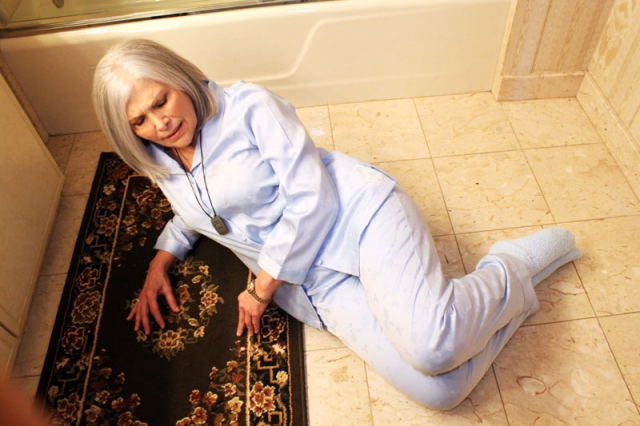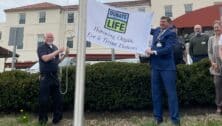Preventing The Dreaded, ‘I’ve Fallen And I Can’t Get Up’ Call

By Gertie Mourar
A recent visit by our caregiver to a customer’s home found her on the floor without a medic alert button. She had fallen and could not get up on her own due to dizziness.
Subsequent tries to get up were thwarted because of dizziness. Our caregiver called 911 immediately. When the medics arrived our client was encouraged to go to the hospital for an evaluation. It was determined she had a mild stroke thus initiating the dizziness.
Medical conditions are one the most common reasons seniors fall. Heart disease or failure (CHF), history of stroke, Parkinson’s Disease, Low blood pressure, Chronic obstructive pulmonary disease (COPD), Diabetes, Arthritis, Vision problems and mental confusion are all possible causes of falls.
One in three adults aged 65 and over fall each year. Among older adults, falls are the leading cause of injury. The CDC reports that in 2013, 2.5 million older adults were treated in emergency departments and approximately one third of these fall victims were admitted for further treatment.
The most common injuries resulting from falls include cuts, fractures, and head traumas. These problems may result in complications, including an increased risk of early death.
Oftentimes, people reduce their activities because they are fearful of falling. This can result in more actual falls, as individuals lose strength and mobility.
Prevention is the easiest and most effective way to eliminate falls. When visiting with your healthcare professional about your own health or that of a loved one:
- Discuss how exercising can help increase strength, mobility, and balance.
- Ensure that vision is accurately corrected by visiting an eye doctor regularly. Impaired vision may result in increased falls.
- Reduce tripping hazards in living areas. Clutter, uneven surfaces, and throw rugs are especially dangerous.
- Wear well-fitting, sensible shoes indoors and out. Loose-fitting, floppy shoes, or walking in socks increase the risk of slipping or stumbling.
- Consider installing grab bars in bathroom and using a raised toilet seat. Ensure that indoor and outdoor stairs have sturdy railings.
- Make sure that all living space is well lit. Always turn the light on before going up or down stairs. Night lights are recommended, especially if a senior routinely gets up in the middle of the night. Keep a flashlight near the bedside to be used in the event of a power outage.
Taking these six precautions will significantly reduce the risk of falling and lead to happier and healthier life for seniors and their extended families.
________
 Gertie Mourar is the owner of Seniors Helping Seniors®, an in-home, non-medical care agency that strives to match healthy seniors with seniors who need a helping hand. Gertie has an intimate understanding of caring for seniors. She can be reached at 484.366.2521 or via email at shs@apathwayforseniors.com.
Gertie Mourar is the owner of Seniors Helping Seniors®, an in-home, non-medical care agency that strives to match healthy seniors with seniors who need a helping hand. Gertie has an intimate understanding of caring for seniors. She can be reached at 484.366.2521 or via email at shs@apathwayforseniors.com.
Connect With Your Community
Subscribe to stay informed!
"*" indicates required fields































![95000-1023_ACJ_BannerAd[1]](https://vista.today/wp-content/uploads/2023/03/95000-1023_ACJ_BannerAd1.jpg)
















